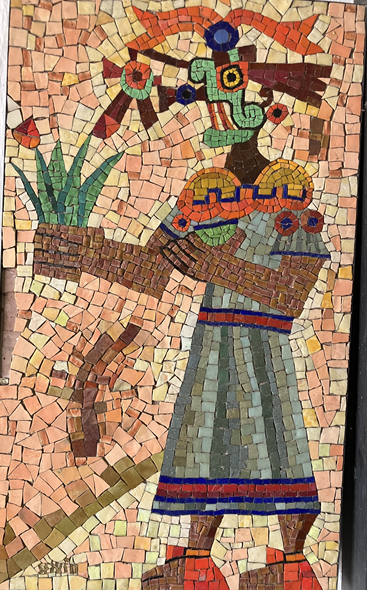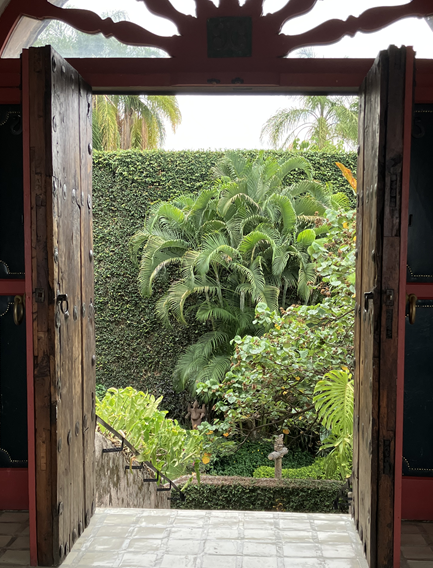In this post, we’ll explore what it takes to be a successful expat, to help you assess whether this lifestyle can work for you.
If you didn’t read Part 1 of this series, I recommend that you start there, for an overview of concept and insights into the financial and lifestyle rewards we’ve enjoyed from Mexico.
For a quick refresher, geoarbitrage is nothing more than earning money in a high-cost economy while living in a low(er)-cost one, i.e. living where your dollars (or Euros and Pounds) go a lot further. With geoarbitrage, it’s possible to increase your net worth without landing a big pay raise, inheriting a windfall, or adding a side-hustle to an already crowded schedule.
Now, let’s look at what it takes to make expat living work.
Traits Needed To Be Successful With Expat Living in Mexico
Most articles on this topic tend to be boosters of the lifestyle, skating past the traits needed to be successful with it, or ignoring them entirely.
I think that’s a mistake, so I put together the following list of traits that expats who enjoy living abroad typically possess.
1. Adaptability. Knowledge of how things work in your home country is likely to be irrelevant or even counter-productive to navigating life in a new country.
For us, the lack of transparency and consistency when dealing with Mexican government agencies means wasted time and lots of surprises. Being adaptable to ever-changing rules and ambiguous processes is essential to getting things done.
The slower pace of life in Mexico is another huge difference. The emphasis in Anglo-Saxon countries on getting things done quickly and efficiently simply isn’t a thing here.
Learning to relax and take things as they come can be a big adjustment for Type A personalities.
2. Lifelong learner. International geoarbitrage will test and stretch your existing skills. It will also ask you to acquire brand-new ones.
There are always new situations and unexpected challenges living in a foreign country. Problem-solving skills are a must as you can’t always hire someone to fix the problem. (If that’s your MO, it can get expensive quickly.)
Perhaps one of the biggest challenges you’re likely to face is becoming competent (if not fluent) in a new language. But it’s essential to embrace this challenge if you want to lead a full life in your new home.
In most parts of Mexico, speaking Spanish opens the door to making local friends and getting to know (and learn all sorts of valuable things from) your neighbors. Spanish skills expand your options tremendously when you need to see a doctor, open a local bank account, or buy food at the best prices in street markets.

Knowing the local language ultimately saves you time and money, while preventing needless stress.
3. Curiosity. Being curious about other cultures goes hand in hand with adaptability and learning new skills like a foreign language.
If you have an innate curiosity about new cultures, this lifestyle will feel exhilarating to you. There are new holidays and festivals to explore, exotic food to taste, local customs and norms to discover, and on and on.
If you’re determined to recreate your old life in a new culture, you’re missing the point, and better off moving to a lower-cost city in your home country, to reap some of the benefits of geoarbitrage, without the added complexity.
4. Self Discipline. Let’s channel our inner Suze Orman for a second. For those imagining life abroad as a path to easy money, I’m going to give you a reality check…
Geoarbitrage won’t solve your economic problems if you have no self-control around spending. You’re likely to adapt quickly to new circumstances and keep overspending.
Before you leap, establish some financial goals and priorities for the endeavor, and stick to them.
5. Organizational skills. Yup, this lifestyle involves a level of complexity you’ve probably never dealt with living and working in one country.
In Mexico, foreign residents have numerous obligations to INM (Immigration office), and it’s your responsibility to ensure you renew your visa(s) on time, file paperwork, and complete in-person procedures when you change addresses, get married, take a new job, and so on.
Plenty of expats find themselves in a mess after years of ignoring these obligations, ending up with hefty fines.
If keeping track of these new (sometimes strange) obligations and their due dates sounds like a nightmare to you, expat living won’t be a great fit.

6. Financial & Technical Acumen. Earning in one currency and spending in another takes a bit more skill than managing your finances in just one… Facility with spreadsheets is a skill that you’ll be grateful to have.
You’ll find yourself moving funds across borders and converting currency at least a few times a month. There’s a learning curve to doing it cost-effectively.
Living in Mexico, you’ll use more mobile apps for daily activities than ever before, because many corporate websites here are dysfunctional (looking at you Totalplay and AT&T Mexico).
You’ll be required to pay taxes (and potentially file) in multiple countries, depending on your activities. It’s also a good idea to investigate how your credit cards treat foreign transactions before relocating, since those fees can add up fast if your card doesn’t waive them.
Practical Requirements to Make Expat Living (and Geoarbitrage) Work
1. You Can Work Remotely and Enjoy It. Assuming you still need to work, it means verifying with your employer that you can work remotely for an indefinite period, not just for a few months, before you move.
Most people envision a young digital nomad as the typical practitioner of geoarbitrage. And where there are many of these folks in Mexico, I’ve met writers, teachers, psychologists, non-profit executives, and all sorts of entrepreneurs also working remotely from Mexico and reaping the benefits of geoarbitrage.

2. You Can Qualify for Residency. If your heart is set on moving to Mexico, there are financial resource requirements that you must satisfy to stay here more than six months. The cost to qualify for a residency visa increased 12% in 2025.
Whatever country you have your heart set on moving to, step 2 is to investigate their residency requirements and confirm that you can meet them (all). If not, keep looking for other low-cost countries where you do qualify.
3. You’ve Built Up a Cash Cushion. Besides qualifying for residency, a savings cushion is essential to help you bridge the first few months in a new country.
During this period you’ll be in discovery mode and likely spending more than you would once you know the ‘lay of the land.’
4. You Do Your Due Diligence. I frequently see posts in Facebook expat groups asking others for advice on where to move. Seriously?
I can’t imagine outsourcing a decision as big as an international move to strangers on social media. While the socials may help you create a list of prospective cities, they’re no substitute for doing your own due diligence.
Once you have some spots identified, calculate the cost-of-living spread between your current city and your desired one. This helps you quantify the financial opportunity in making the change, and whether it’s worth all the effort involved.
What do things cost in your new destination? It’s critical that you do your research before moving or you could be in for a shock. My post from March 2025 examining what it costs to live in four Mexican cities popular with expats is a good place to start if you’re considering an urban location.

However, if you have your sights set on a more touristy spot like Puerto Vallarta or Cabo, it will cost you more. Go into the experiment with your eyes open, and with some data.
Other ways to research this question include websites such as numbeo.com, but I would caution that this data can be aged with lowball numbers – or get skewed by outliers as it’s crowdsourced.
Visiting potential destinations before taking the plunge also helps you sort out which places you’d enjoy living and which ones don’t meet your needs. Armchair research is no substitute for how a place feels to you. If it isn’t a fit, that’s a horrible thing to discover once you’re already there.
5. Flexibility. Take inventory of your commitments.
Would being far away from family and your current friends be a serious hardship for you? Are there twelve weddings and bar mitzvahs coming up that you just can’t miss? Maybe you have a sick relative or grandchildren you want to be near.
If you have recurring in-person commitments in your home country, this lifestyle will create a logistical hell for you and probably won’t make you happy.
6. You Aren’t Put Off by the Disruption of Actually Moving. If you own your own home, the decision on whether to keep it or sell it is a big one. Give it careful thought, and if you’re looking for an insurance policy, consider renting it out or having someone help with maintenance while you’re gone.
Selling off large assets you won’t need living abroad is a smart move. (of course, if you don’t expect to return I’m an advocate of bringing along your favorite things)
We sold tons of furniture, cars, bikes, athletic equipment, plants, and other stuff before moving. We also donated, gifted, and trashed plenty of possessions along the way.
It took many evenings and weekends, Craigslist posts, and garage sales to get done, not to mention all the planning. For a time it will consume your life.
If this sounds like a huge headache that’s not worth the trouble, then you’re better off staying put.
7. A Reliable Person in Your Home Country. You will want to identify a family member or close friend who can handle your snail mail while you’re gone.
Having someone reliable to look after high-value personal mail for you, e.g. tax docs from the IRS, auto registration renewal notices, wedding invitations, etc. is a very good idea.
Maintaining a physical address in the U.S. is also critical for your financial accounts.
Family is typically best for this task, for the trust factor, and because it’s a genuine residential address.
Some companies provide mailing addresses, as well as scanning and forwarding services, but you are taking a risk using this as your official address.
It’s no fun if your banking institution discovers that your residential address on file is actually a mailbox with a commercial business, and promptly shuts down your account(s).

Though we’re living a higher quality life in Mexico than we ever did in Colorado, this lifestyle has its detractors.
Some believe leaving a wealthy country to accelerate progress towards financial goals is selfish.
Conservatives think workers should stay put and “pay their dues” like generations before them, i.e. be “team players.” All the cliches.
Liberals think moving to a poorer country where your purchasing power stretches further is socially irresponsible, even exploitative.
For both, the answer seems to be … Stay put, keep struggling.
I suggest paying them no mind. After all, people have been crossing borders to improve their economic situation since the beginning of time. And we have just one life to live, so my mantra is…
Everyone deserves to live their best life, and it’s only natural to take the best opportunities you have available to you.
In reality, foreign residents contribute to their adopted countries in all sorts of ways. They bring new skills, start businesses, hire people, invest capital, volunteer, pay taxes, and more when they move across borders. It’s a two-way street.
Ultimately, a life abroad offers the chance to live and work in a setting better suited to your wants and needs, enjoying a higher quality of life at a much lower cost than in your native country.
To those thinking this sounds amazing… Carpe diem!

